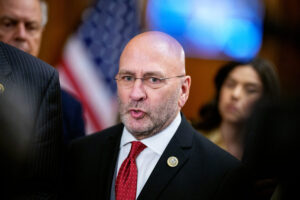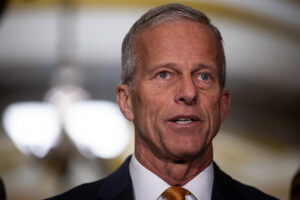Congress
Britt and Schumer have rare bipartisan chat as senators feel out shutdown endgame
A key GOP appropriator spoke with Senate Minority Leader Chuck Schumer Tuesday and again Thursday in rare bipartisan conversations involving the top Democrat as rank-and-file senators hunt for ways to end the 30-day government shutdown.
Sen. Katie Britt (R-Ala.), who chairs the Appropriations subcommittee on Homeland Security, confirmed she spoke to Schumer about “wanting to lay the foundation for us to be able to do our appropriations work.”
Before the Thursday conversation, Britt met with Senate Majority Leader John Thune about appropriators’ push to move the three-funding bill minibus alongside a new stopgap through mid-December.
Asked about the conversation later Thursday, Thune sidestepped a question about whether he asked Britt to speak to Schumer but offered general support for the bipartisan talks. “The solution here is not going to run through Schumer,” he said.
Schumer met Thursday with members of his own caucus, including Sens. Jeanne Shaheen (D-N.H.), and Angus King (I-Maine), who have been in talks with Britt and other Republicans.
Schumer did not respond to multiple questions Thursday about the funding talks. But rank-and-file Democrats who are involved are privately feeling cautiously optimistic about finding a path out of the shutdown as soon as next week, according to a person granted anonymity to disclose private discussions.
Senators left the Capitol for the weekend after a Thursday afternoon vote and will return to session Monday evening.
Congress
Republicans quickly push back on Trump’s call to nix filibuster
Republicans are quickly tamping down President Donald Trump’s call to eliminate the Senate filibuster as they try to keep pressure on Democrats to end the 31-day government shutdown.
GOP leaders believed Thursday they were on track to reopen agencies as soon as next week. Then Trump threw a fresh complication into their laps overnight when he revived calls for Republicans to invoke the “nuclear option” and eliminate the 60-vote threshold for passing most legislation. Without it, Republican senators could reopen the government on their own.
But many GOP senators have vocally defended the filibuster, including Majority Leader John Thune, calling the 60-vote rule a fundamental feature of the Senate and one that works to conservatives’ benefit in the long run.
Thune has defended the filibuster multiple times during the shutdown, calling it a “bad idea” to suggest eliminating it. “The 60-vote threshold has protected this country,” he said earlier this month.
Ryan Wrasse, a spokesperson for the South Dakota Republican, said in a statement on Friday that “Leader Thune’s position on the importance of the legislative filibuster is unchanged.”
Kate Noyes — a spokesperson for Sen. John Barrasso of Wyoming, the No. 2 GOP leader — said on Friday his position in support of the legislative filibuster also hasn’t changed.
Speaker Mike Johnson, who has no direct role in Senate affairs but occupies a key role in managing the shutdown, also struck a cautionary note in comments to reporters Friday.
He called the filibuster a “Senate chamber issue” but added that it “has traditionally been viewed as a very important safeguard.”
“If the shoe was on the other foot, I don’t think our team would like it,” Johnson said.
Trump’s demand — made in a pair of Truth Social posts — came just as GOP senators believed they were on the brink of convincing enough Senate Democrats to reopen the government. A bipartisan group of rank-and-file senators are planning to talk through the weekend, with some lawmakers believing a deal could be reached by the middle of next week.
“BECAUSE OF THE FACT THAT THE DEMOCRATS HAVE GONE STONE COLD ‘CRAZY,’ THE CHOICE IS CLEAR — INITIATE THE ‘NUCLEAR OPTION,’ GET RID OF THE FILIBUSTER AND, MAKE AMERICA GREAT AGAIN!” Trump wrote.
He separately indicated he wanted the rules changed not only to reopen the government but to also pass other GOP priorities before Democrats regain power and eliminate the filibuster themselves.
“Democrats will exercise their rights, and it will be done in the first day they take office, regardless of whether or not we do it,” he wrote.
To change the chamber’s rules, Republicans would need 50 votes plus a tiebreak from Vice President JD Vance — meaning they could lose no more than three senators.
Republicans do not currently have the votes within the conference to nix the filibuster, four people granted anonymity to discuss internal deliberations told Blue Light News Friday.
Beyond Thune and Barrasso, Trump is already getting other public defections.
“The filibuster forces us to find common ground in the Senate. Power changes hands, but principles shouldn’t. I’m a firm no on eliminating it,” Sen. John Curtis (R-Utah) wrote on X on Friday.
Daniel Keylin, a spokesperson for Sen. Thom Tillis, said Friday that the North Carolina Republican “would never vote to eliminate the legislative filibuster under any circumstance.”
Prior to Trump’s postings Thursday, more than a dozen GOP senators had rejected chatter about changing Senate rules as the shutdown dragged on in recent weeks. Those include Tillis and Sen. Lisa Murkowski of Alaska, who both have an independent streak, as well as frequent Trump allies such as Sens. John Cornyn (R-Texas), Kevin Cramer (R-N.D.) and James Lankford (R-Okla.).
And then there’s Sen. Mitch McConnell of Kentucky, who as majority leader during Trump’s first term, repeatedly fended off the president’s previous attacks on the filibuster.
McConnell didn’t immediately respond on Friday to Trump’s comments. But his office pointed back to comments he made in a recent biography: “Trump asked me to go nuclear and I had a one word answer: ‘No.’”
Some of the GOP fervor to eliminate the filibuster is coming from the House, where some conservative hard-liners have raised the possibility of muscling spending legislation past Democrats by changing the other chamber’s rules.
Rep. Marjorie Taylor Greene (R-Ga.), for instance, pressed Johnson on the idea during a House Republican Conference call this week, urging the Senate GOP to simply change the rules and pass the House-approved stopgap spending bill.
But other voices in the GOP aren’t sold, and Johnson’s wariness Friday reflects widespread sentiment in his ranks.
Johnson chalked up Trump’s comments to what some other Republicans speculated privately on Friday: That Trump, like GOP lawmakers, is growing frustrated by the weeks-long shutdown, which is on track to break the 35-day record next week.
“What you’re seeing is an expression of the president’s anger at the situation. He is as angry as I am and the American people are about this madness, and he just desperately wants the government to be reopened,” Johnson added.
Meredith Lee Hill contributed to this report.
Congress
Trump urges Republicans to kill the filibuster
President Donald Trump on Thursday night urged the GOP to eliminate the filibuster and end a monthlong government shutdown and standoff between Republicans and Democrats.
“Get rid of the Filibuster, and get rid of it, NOW!'” Trump posted on his social media platform Truth Social.
In a separate post, he wrote, “THE CHOICE IS CLEAR — INITIATE THE “NUCLEAR OPTION,” GET RID OF THE FILIBUSTER AND, MAKE AMERICA GREAT AGAIN!”
The filibuster is a long-standing Senate rule that allows the minority to delay or block legislation by extending debate, effectively requiring 60 votes to advance most bills. Senate Majority Leader John Thune, a Republican and staunch institutionalist, has previously ruled out eliminating or weakening the 60-vote threshold, describing it as a “bulwark against a lot of really bad things.”
As the government shutdown enters its 30th day, there is no obvious end in sight, though Republicans and Democrats have both signaled openness to a solution.
Trump said he had “thought a great deal” about the impasse while flying back to Washington from Asia. “If we did what we should be doing, it would IMMEDIATELY end this ridiculous, Country destroying ‘SHUT DOWN,’” he said, adding Democrats would scrap the filibuster if they got the chance.
Some Democrats under former President Joe Biden, such as Minnesota Sen. Amy Klobuchar, indeed called for changes to filibuster rules to make it harder to block or stall legislation, and others called for carve-outs on voting and reproductive rights bills.
While both parties have chipped away at the filibuster over the years, Trump’s demand to kill it would be unprecedented and require a simple majority of 51 votes. But though some Senate Republicans have said they’re open to it, a few haven’t, and there’s only 53 of them, so Trump might not have the votes for his “nuclear option.”
North Carolina Sen. Thom Tillis said last week the “filibuster is not going away this Congress … I think Republicans have made that very clear.” Alaska Sen. Lisa Murkowski, Texas Sen. John Cornyn and Oklahoma Sen. James Lankford also voiced their opposition to nixing the rule.
The Senate Republicans who have warmed to the idea of overturning the filibuster to reopen the government as the shutdown drags on include Alabama Sen. Tommy Tuberville, who said it was “probably a viable option,” and Missouri Sen. Josh Hawley, who said, “My thought is that I’m not willing to see children in my state go hungry … over some Senate procedure.”
This is not Trump’s first time calling for the filibuster to be axed. He called the rule a “joke” during his first term in 2017, tweeting that it was “killing” the GOP and “allows 8 Dems to control [the] country.” And, again in 2018, he urged Republicans to use the “Nuclear Option to pass tough laws NOW.”
With the Senate is not scheduled to return to Washington until Monday evening, the government shutdown is approaching the record for the longest ever: 35 days.
Congress
Why Mark Warner is sitting out the shutdown
Not so long ago, if there was a bipartisan group getting together to solve a problem in the Senate, you could count on Mark Warner to be involved.
The Virginia Democrat was part of the “talking stick” gang that helped quickly end a brief 2018 funding lapse. He was a part of a crew that helped cut a major infrastructure deal under former President Joe Biden, and he’s currently working with Republicans to forge an agreement on cryptocurrency regulation.
But as his colleagues hunt for a way out of the 31-day-and-counting government shutdown, Warner this time is hanging on the sidelines.
It’s a twist not only because of Warner’s history as a card-carrying bipartisan “gang” member who would frequently host gatherings at his Old Town Alexandria home. It’s also because of who he represents: His home state has the third-highest number of civilian government workers, plus tens of thousands more in military uniforms. Lawmakers from the Washington area have historically been voices of moderation urging both parties to avoid brinkmanship that could harm the federal workforce.
Yet as the shutdown’s toll has mounted, Warner and his home-state teammate, Democratic Sen. Tim Kaine, have stuck closely to their party’s line — sounding the alarm over the impending expiration of key federal health insurance subsidies and blaming the impending lapse of nutrition assistance on Republicans.
“He’s always been one of those guys who says, ‘I’ll be part of any gang,’ the sort of ultimate bipartisan leader,” said Rep. Don Beyer (D-Va.). “I think he’s just really frustrated and unhappy with the situation, the shutdown, with what’s happening to Virginians. … I think it just pisses him off.”
In Warner’s estimation, what sets this shutdown apart is his belief that it won’t be solved by a Senate gang, but by one person: President Donald Trump.
Warner publicly aired his concerns this week when he gabbed to reporters alongside Sen. Lisa Murkowski (R-Alaska), another bipartisan gang regular who has been involved in the current rank-and-file talks.
After she mentioned the virtues of cross-aisle conversations and the importance of trust, Warner said while Murkowski might feel free to negotiate without Trump’s blessing, “some of the others would have to get a permission slip.”
“I really do think, unlike in the past, you’ve probably got to get the president deeply engaged,” he added.
Warner’s office declined a request for an extended interview. But he confirmed in a brief exchange Thursday that he has not joined the pending shutdown talks — pointing to both his belief that Trump is the key player in ending the stalemate as well as his focus on helping land a cryptocurrency deal.
But there’s also a larger backdrop to Warner’s withdrawal — how the Senate’s partisan fault lines have hardened during the second Trump presidency.
Senate Republicans have repeatedly sidelined Democrats this year at major points, passing a sweeping domestic policy bill along party lines this summer that also included a debt ceiling hike — sidestepping a default cliff that has previously forced bipartisan compromise.
In March, Republicans drafted a stopgap funding bill on their own and then essentially dared Democrats to shut down the government. Senate Minority Leader Chuck Schumer flinched then, but one big hint that Democrats wouldn’t be up for a repeat was that Warner did not join him at that time in helping to advance the shutdown-averting legislation. In a statement with Kaine, Warner explained that the stopgap gave a “blank check to Donald Trump and Elon Musk to continue attacking the federal workforce.”
Now he’s repeatedly voted against the latest House-passed spending patch, which would fund the government until Nov. 21. Warner has backup from fellow Virginia Democrats, who say Trump’s willingness to take a sledgehammer to the federal government this year is affecting what they are hearing back home.
“They’re viewing the shutdown sort of as a continuity of the Donald Trump term two status quo,” Kaine said. He summed up his constituents’ feelings as, “It’s good that you are fighting finally because we’ve been on the receiving end of this since Jan. 20, and it’s time somebody stands up to this guy.”
Warner, unlike Kaine, is up for reelection next year, and political prognosticators widely expect him to easily keep his seat. But Warner, 70, has taken nothing for granted politically after narrowly squeaking out a win by less than a percentage point in 2014. In 2020, Warner won by 12 points.
These days, Warner is leaning into his willingness to fight Trump and calling himself one of Republicans’ “top targets” in his fundraising efforts, even though there’s little to suggest he’s worried about a razor-thin November contest.
“I am doing everything in my power to stop Trump and his unelected co-president from overhauling the federal government so they can enrich themselves and leave Americans in the dust. But that makes me one of their top targets,” Warner wrote in one recent online fundraising solicitation.
Warner has also been sharply critical of Trump and his administration on various other fronts. As the top Democrat on the Senate Intelligence Committee, he held a lengthy news conference Thursday to lambast the administration for briefing Senate Republicans on recent military strikes on alleged drug traffickers in the Caribbean but not Democrats.
“The one area that I thought we could maintain some level of comity … was around national security, but not from this crowd,” he said, describing the difference between Trump’s first and second terms as “night and day.”
Bob Holsworth, a longtime Virginia political analyst, said Warner’s more “aggressively critical” stance toward Trump is part of a long-running political evolution.
“It reflects the changes that have occurred nationally and certainly in Virginia,” Holsworth said. “Virginia … clearly on state-wide elections tilts blue.”
Warner has also embraced a push led by Sen. Cory Booker (D-N.J.) in recent years to get Democratic lawmakers more comfortable delivering their message online, including by cutting shareable short-form videos. In one recent shutdown-themed clip, Warner sought to debunk “as many Republican lies as I can in 90 seconds.”
And he leaned into social media to dispel rumors being circulated from some Republicans who thought the in-cycle senator would quickly relent on the shutdown and vote for the House-passed stopgap. “Not caving,” he wrote on X.
Beyer predicted that if the shutdown does play into Warner’s race next year it would only help him.
“They’re never going to assign blame on the shutdown to him — [Republicans] have the White House, they have the Senate, they have the House,” he said. “Regardless of the national landscape, he’s been a constructive part of our polity and our economy now for a generation.”
-
Uncategorized12 months ago
Bob Good to step down as Freedom Caucus chair this week
-

 Politics8 months ago
Politics8 months agoFormer ‘Squad’ members launching ‘Bowman and Bush’ YouTube show
-

 The Josh Fourrier Show12 months ago
The Josh Fourrier Show12 months agoDOOMSDAY: Trump won, now what?
-

 The Dictatorship9 months ago
The Dictatorship9 months agoPete Hegseth’s tenure at the Pentagon goes from bad to worse
-

 Politics8 months ago
Politics8 months agoBlue Light News’s Editorial Director Ryan Hutchins speaks at Blue Light News’s 2025 Governors Summit
-

 The Dictatorship9 months ago
The Dictatorship9 months agoLuigi Mangione acknowledges public support in first official statement since arrest
-

 Politics8 months ago
Politics8 months agoFormer Kentucky AG Daniel Cameron launches Senate bid
-

 Politics12 months ago
Politics12 months agoWhat 7 political experts will be watching at Tuesday’s debate









